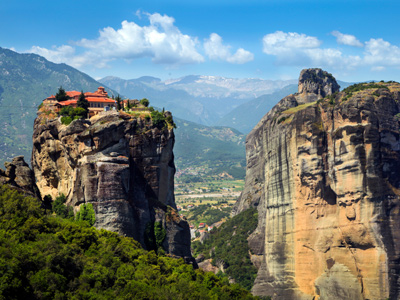
Ask the AI Tutor
Need help with Ancient Greece? Ask our AI Tutor!
AI Tutor - Lucy
Connecting with Tutor...
Please wait while we establish connection

The landscape was mountainous in Greece.
Ancient Greece
Travel back to Ancient Greece, a land of clever thinkers, brave warriors and busy city-states. This quiz checks what you know about their daily life and beliefs.
1 .
Who conquered the Greeks in 168 BCE?
Romans
Persians
British
Egyptians
The Romans adopted much of the culture of the Ancient Greeks
2 .
What was the landscape like in Greece?
Desert
Tropical rain forest
Tundra
Mountainous
The mountains made it difficult to travel over Greece
3 .
Who was the Greek leader that ruled all of Greece and conquered other lands?
Alfred the Great
Aristotle
Augustus
Alexander the Great
The Egyptian city of Alexandria is named after him
4 .
At which battle were the Persians defeated?
Olympia
Marathon
Sparta
Troy
Legend has it that the Greek messenger Pheidippides ran to Athens with news of the victory and so ran the very first 'marathon'
5 .
What was the climate like in Greece?
Cold and wet
Warm and dry
Tropical
Very cold
Crops do not grow very well in Greece except olives
6 .
Which of these was NOT a Greek city state?
Athens
Sparta
Rome
Corinth
Rome was in modern day Italy
7 .
What were the people of Ancient Greece called?
Aztecs
Romans
Greeks
Persians
The Greeks themselves called their land Hellas and themselves Hellenes
8 .
In which year did the Greek Classical Period begin?
3,000 BCE
480 BCE
480 CE
2,000 CE
The Classical Period of Ancient Greece is said to have begun with the defeat of the invading Persian army
9 .
The city states joined together to fight which invaders?
Celts
Aztecs
Egyptians
Persians
The Persians were beaten at the Battle of Marathon, the Battle of Salamis and the Battle of Plataea
10 .
What was the name of the people who lived in Crete around 3,000 BCE?
Persians
Maya
Minoans
Mycenaeans
The Minoans took their name from the mythical King Minos who was said to have built a labyrinth to house the Minotaur
**Unlimited Quizzes Await You! 🚀**
Hey there, quiz champ! 🌟 You've already tackled today's free questions.
Ready for more?
Ready for more?
🔓 Unlock UNLIMITED Quizzes and challenge yourself every day. But that's
not all...
not all...
🔥 As a Subscriber you can join our thrilling "Daily Streak" against other
quizzers. Try to win a coveted spot on our Hall of Fame Page.
quizzers. Try to win a coveted spot on our Hall of Fame Page.
Don't miss out! Join us now and keep the fun rolling. 🎉
**Unlimited Quizzes Await You! 🚀**
Hey there, quiz champ! 🌟 You've already tackled today's free questions. Ready for more?
🔓 Unlock UNLIMITED Quizzes and challenge yourself every day. But that's not all...
🔥 As a Subscriber you can join our thrilling "Daily Streak" against other quizzers. Try to win a coveted spot on our Hall of Fame Page.
Don't miss out! Join us now and keep the fun rolling. 🎉






